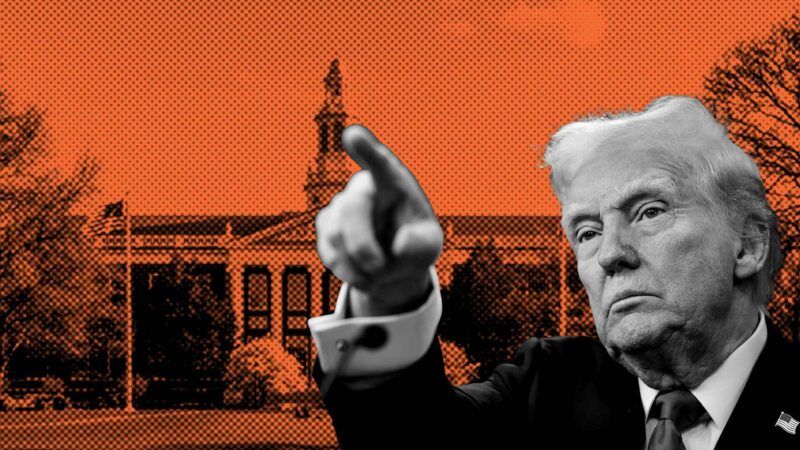Harvard's Best Protection Is To Get Off the Federal Teat
It's the best shield when the executive branch tries to strong-arm private universities.

The Trump administration announced on Thursday that it is rescinding Harvard University's ability to enroll international students, increasing pressure on the school to fall in line with the president's agenda. In a letter obtained by The New York Times, Homeland Security Secretary Kristi Noem told the university: "I am writing to inform you that, effective immediately, Harvard University's Student and Exchange Visitor Program certification is revoked."
Without this certification, Harvard can no longer enroll international students, and the roughly 6,800 international students currently enrolled must transfer or lose their legal status. A Department of Homeland Security news release called Harvard's campus climate "toxic," accusing the university of "creating an unsafe campus by permitting anti-American pro-terrorist agitators to harass and physically assault individuals, including Jewish students, and otherwise obstructing its once-venerable learning environment." The department claims that many of these "agitators" are foreign students.
The move is yet another escalation in the ongoing feud between President Donald Trump and the nation's oldest university. Since taking office, Trump has attempted to pressure both public and private colleges and universities to change a wide range of policies across governance, discipline, hiring, and admissions. Some of his demands have been rather sweeping: Noem's letter, for example, says that to regain the certification, the school must hand over "all audio or video footage, in the possession of Harvard University, of any protest activity involving a nonimmigrant student on a Harvard University campus in the last five years." Notably, this request does not specify that the protest be violent or illegal.
Columbia University is currently negotiating a consent decree that would name a federal judge to oversee changes to protest policies, security practices, and its Middle East studies department. Columbia agreed to Trump's demands after his administration canceled $400 million in federal grants; it has yet to see the funding reinstated.
After its bold refusal to comply with Trump's demands, Harvard seems to have been singled out for its insubordination. Trump retaliated by freezing $2.6 billion in federal research grants to the university, and Thursday's move threatens even more of Harvard's bottom line. About 27 percent of the student body is made up of international students (up from 19.7 percent in the 2010–2011 school year), many of whom pay a larger share of education costs.
Trump may have more weapons up his sleeve. The president is considering stripping Harvard's tax-exempt status, valued at $425 million. (That would first require an IRS review.) Meanwhile, congressional Republicans are attempting to significantly increase the amount some universities pay in taxes on investment returns on endowments from 1.4 percent to as high as 21 percent.
The feud raises the question of why an institution like Harvard—which has an endowment of over $53 billion—needs government money in the first place. Trump is not the first president, nor will he be the last, to use the power of the executive branch to strong-arm private universities. One way Harvard can protect its independence and mitigate intrusive government interference is by weaning itself from federal funding, and thus freeing itself from the strings that come attached to the funds. Obviously, that won't keep the government from trying to push institutions around in other ways, such as taxation or immigration controls. But it would remove a big pressure point.
Harvard has filed lawsuits challenging the conditions Trump is trying to impose. But no matter who prevails in the legal battles to come, free speech and pluralism will be better off if Harvard—and other private universities—start eschewing federal money.


Show Comments (91)